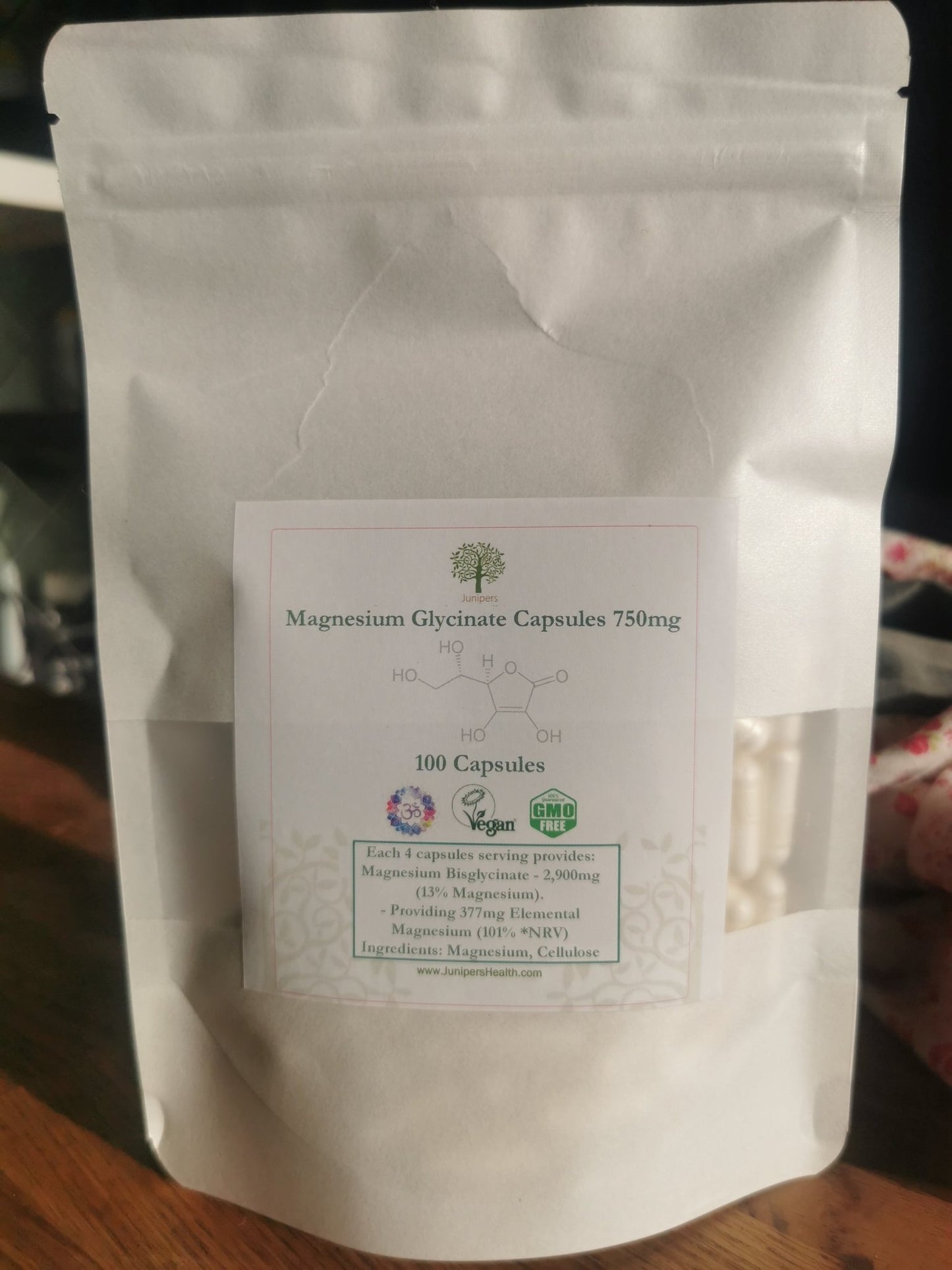Junipers
Magnesium Glycinate 100 750mg Capsules
Magnesium Glycinate 100 750mg Capsules
No se pudo cargar la disponibilidad de retiro
- Chelated 'bioavailable' form of magnesium
- 500mg Magnesium Glycinate Per capsule
-250mg elemental magnesium per 4 capsule serving
Considering all of the important roles that magnesium plays in the body — and the fact that a magnesium deficiency is one of the leading nutrient deficiencies in adults with an estimated 80 percent being deficient in this vital mineral — it’s a good idea to consider taking magnesium supplements regularly and eating magnesium rich foods.
The amount of research regarding the benefits of magnesium and the need to take magnesium supplements to counteract a deficiency is staggering.
For many people, a magnesium deficiency — also known as hypomagnesemia, with “hypo” meaning under, “magnes” referring to magnesium and “-emia” meaning in the blood — causes noticeable negative symptoms, including muscle aches or spasms, poor digestion, anxiety, and trouble sleeping. Yet, magnesium deficiency is often overlooked and rarely tested. Therefore, magnesium may be one of the most underutilized but most necessary supplements there is.
Magnesium — which comes from the obsolete root word magnes, which was used to mean magnet or magnetic power — may not be the most present mineral in our bodies in terms of its quantity, but it’s certainly one of the most crucial to overall health. It’s actually involved in over 300 biochemical functions in the body, such as regulating heartbeat rhythms and helping neurotransmitter functions, which is why hypomagnesemia is something you want to nip in the bud.
The Need for Magnesium Supplements
A magnesium deficiency can cause significant symptoms. Some of the most prominent include:
- hypertension and cardiovascular disease
- kidney and liver damage
- peroxynitrite damage that can lead to migraine headaches, multiple sclerosis, glaucoma or Alzheimer’s disease
- nutrient deficiencies, including vitamin K, vitamin B1, calcium and potassium
- restless leg syndrome
- worsened PMS symptoms
- behavioral disorders and mood swings
- insomnia and trouble sleeping
- osteoporosis
- recurrent bacterial or fungal infections due to low levels of nitric oxide or a depressed immune system
- tooth cavities
- muscle weakness and cramps
- impotence
- eclampsia and preeclampsia
Types of Magnesium Supplements
- Magnesium Chelate — highly absorbable by the body and the kind found in foods naturally. This type is bound to multiple amino acids (proteins) and used to restore magnesium levels.
- Magnesium Citrate — magnesium combined with citric acid. This may have a laxative effect in some cases when taken in high doses but is otherwise safe to use for improving digestion and preventing constipation.
- Magnesium Chloride Oil — an oil form of magnesium that can be applied to skin. It’s also given to people who have digestive disorders that prevent normal absorption of magnesium from their food. Athletes sometimes use magnesium oil to increase energy and endurance, to dull muscle pain, and to heal wounds or skin irritation.
- Magnesium Glycinate — highly absorbable, this is recommended for anyone with a known magnesium deficiency and less likely to cause laxative effects than some other magnesium supplements.
- Magnesium Threonate — has a high level of absorbability/bioavailability since it can penetrate the mitochondrial membrane. This type is not as readily available, but as more research is conducted, it may become more widely used.
- Magnesium Orotate — these supplements have orotic acid, and magnesium orotate is beneficial to the heart.
Top 9 Health Benefits of Magnesium
Magnesium has many benefits throughout all the body’s critical functions. From nerves to cells to muscles, magnesium is hard at work regulating and promoting proper function.
1. Helps Increase Energy
.
2. Calms Nerves and Anxiety
3. Treats Insomnia and Helps You Fall Asleep
4. Helps with Digestion by Relieving Constipation
5. Relieves Muscle Aches and Spasms
6. Regulates Levels of Calcium, Potassium and Sodium
7. Important for Heart Health.
8. Prevents Migraine Headaches
Magnesium Glycinate has been difficult to source in the UK and europe, so Im pleased to introduce a good pure grade product.
Share






